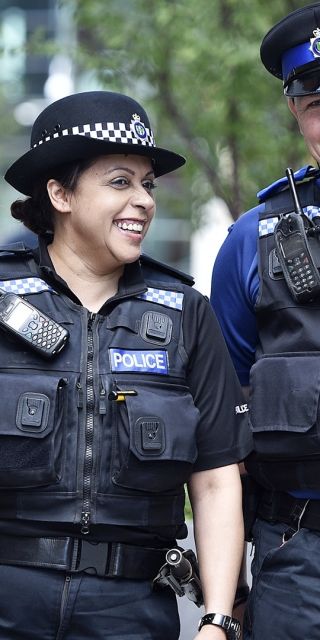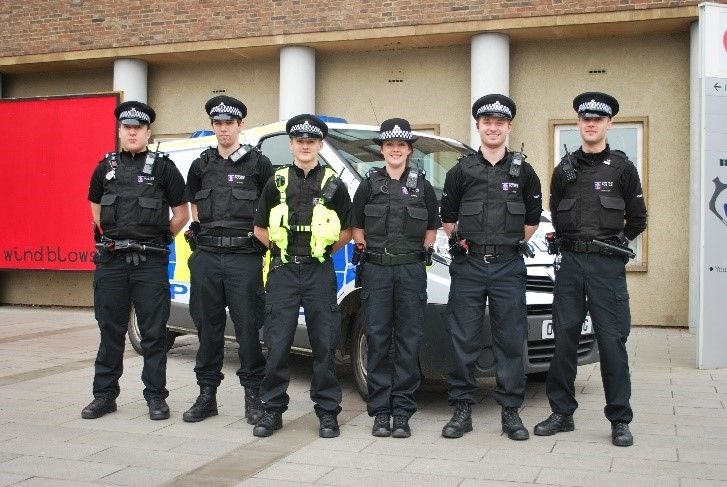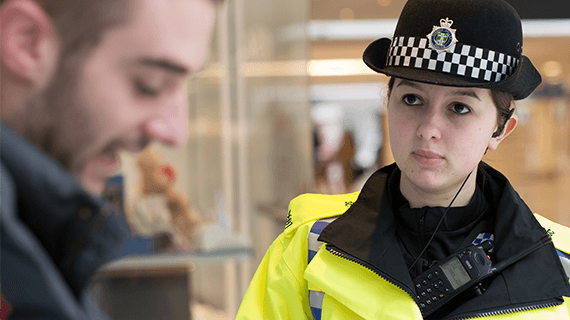
Police Constable Degree Apprenticeship (Level 6)
| Level | 6 |
| Degree | BSc (Hons) Professional Policy Practice |
| Duration | 36 months |
| Entry point(s) | Autumn |
| Campus | Workplace/ Remote |
| Contact | apprenticeships@bnu.ac.uk |
This apprenticeship programme is work-based integrating academic and practice-based learning through collaboration with the University and Thames Valley Police. The programme aims to develop learners knowledge, skills and behaviours to ensure the learner is work ready for the role of a police officer. It is vital to the delivery of an enhanced service Buckinghamshire New University to the public to produce highly competent Police Constables due to the everchanging, challenging, transformation of modern policing. The programme aims to equip the learner with the knowledge and understanding, insight, perspectives and skills with which to perform the role of a Police Constable within Thames Valley Police and to gain an understanding of policing in its wider context. The programme further develops vocational and professional training adding a layer of intellectual skills relevant to policing which will provide graduates with an understanding of the concepts, principles, protocols, procedures and legislation which are all pertinent to the police officer role.
From 2020, the entry requirements to policing at police constable rank require all officers to either obtain or already have a degree level qualification in what is an increasingly challenging and demanding occupation, but also one which provides a great degree of job satisfaction. We work in partnership with Thames Valley Police to provide the Police Constable Degree Apprenticeship (PCDA) so that driven and talented individuals can apply to be Thames Valley Police Apprentice Constables and also gain a degree whilst working and earning.
The PCDA is a challenging, yet rewarding three-year programme combining on-the-job practical learning, academic learning and operational competence. Successful apprentices graduate with a nationally recognised honours degree in Professional Policing Practice.
Policing increasingly requires its professionals to have graduate-level skills including the ability to think critically, reflect and deliberate effectively, exercise judgement, challenge accepted norms, contribute to the evolving evidence base, work with a high degree of autonomy, communicate confidently and make decisions independently. The PCDA is one of the new entry routes into the profession and our PCDA programme provides new officers with the opportunity to develop these skills whilst gaining an understanding of areas which are critical for policing in the modern era, including cybercrime and dealing with vulnerable people.
On successful completion of this programme, you will gain the qualification of BSc (Hons) Professional Policing Practice.


Programme aims
- Develop learners’ operational expertise alongside relevant interpersonal, ethical and leadership skills through the application of methods and techniques to review, consolidate, extend and apply knowledge in a professional policing context in line with the College of Policing national curriculum and within the apprenticeship standards of behaviour, skills and knowledge.
- Advance learners’ operational expertise alongside relevant interpersonal, ethical and leadership skills through the application of methods and techniques to review, consolidate, extend, and apply knowledge in a professional policing context.
- Enable learners to critically evaluate the strategic choices available to police organisations, demonstrating a critical appreciation of how operational and organisational decisions are taken in their economic, social, and cultural contexts.
- Equip learners with a coherent and detailed knowledge and understanding of the requirements of 21st century policing, including how police organisation’s function and are managed according to the needs of communities.
- Provide learners with the knowledge and skills to undertake a work-based research project to identify improvements to professional policing practice.
High level skills knowledge and behaviours are developed such as emotional intelligence, strong behavioural interpretation skills, with the ability to problem solve, analysing and resolving evolving events rapidly to enable learners to be work ready. There is a strong focus on safeguarding, career progression, fundamental British values, green skills, Prevent agenda, enrichment, English and mathematics (both academic and functional).
Technology is a fundamental key theme interwoven into the programme for learners to become digitally enabled and work ready for rapid change as we are on the cusp of the 4th Industrial Revolution. Discussions will be around technology in the workplace and what future technology may be available not only in the next 2-3 years but in the next 10-15 years. There is a strong focus on becoming digitally enabled in the workplace as most job roles have a digital component
Developed in consultation with Thames Valley Police and covering all aspects of the College of Policing’s national curriculum for Professional Policing, the programme provides the opportunity for the learner, after successful completion of the apprenticeship and graduation, to be confirmed in the rank of constable. The programme aims also include transferrable skills which are equally valued in other roles within the Criminal Justice System and beyond.
The learner’s professional development is reflected through formal and informal assessments and discussions within teaching sessions, with practical work-based activities. There is a large part of teaching that is supportive to the learner as the job of being a police officer can be difficult. Working in such a demanding job and studying is recognised and supportive measures are in place with named reviewers and personal tutors allocated to each learner. Apprentices will receive guidance and support throughout their learning journey from the Apprenticeship Hub through regular reviews and contact.
Programme Outline
Year one: A blended learning programme delivered by TVP and Buckinghamshire New University with initial learning based at TVP’s Training Centre in Sulhamstead, Reading. Apprentices will then join their designated Local Policing Area (LPA) for a period of operational tutoring leading to Independent Patrol Status.
Year two: Builds on the first year of learning but with more operational focus including response, investigation, intelligence, community policing and roads policing.
Year three: As part of the End Point Assessment apprentices will complete an Evidence-Based Research Project and achieve Full Operational Competence. The research project has a practical policing purpose; demonstrating learning, critical thinking and problem-solving skills.
You can find details about the PCDA programme on the Thames Valley Police website or you can visit the College of Policing website for more information on careers within the police. Full details of the PCDA standards are also available on the Government’s website.
Why choose BNU?
At Buckinghamshire New University, we are dedicated to equipping our graduates with the skills employers demand. We will work with you using our practice-based learning expertise to support your training needs.
Higher and degree apprenticeships are a partnership between industry and higher education institutions set up to help meet the needs of employers. They also provide a flexible way for employees to take advantage of the life-changing opportunities that higher education can offer them.
At BNU, we change lives through employment-focused teaching which enables our students to achieve their ambitions. As a small and personal university, we offer an agile approach to all apprenticeship training needs. You would also gain access to all our support services including Student Hub, Multi Faith Chaplaincy, Disability and Inclusion, Counselling, Library and Alumni Benefits.
Our Apprenticeship Hub at BNU strives to deliver a supportive environment for the employer and the apprentice. Tripartite reviews are conduced quarterly to aid apprentice through their apprenticeship journey successfully.
The University’s general entry requirements will apply to admission to this programme with the following additions / exceptions:
- Thames Valley Police will set the selection criteria for their Apprenticeships. Most candidates will have A levels (or equivalent) or existing relevant Level 3 qualifications, and English, Maths and ICT at Level 2. Other relevant or prior experience may also be considered as an alternative. Applicants must provide evidence of above or be asked to re-sit English and Mathematics functional skills level 2. Completion of level 2 (not applicable for learners with GCSE C or above or GCSE 4 or 5 if they can provided their certificates).
- All learners take an online initial assessment- Basic Key Skills Builder (BKSB) to assess and develop skills in English and maths to support functional skills requirements. Something all apprentices much achieve before taking their End Point Assessment (EPA).

How to apply
Register your interest
- Contact BNU’s Apprenticeship via email: apprenticeships@bnu.ac.uk or call: 01296 744202
- Interested employers will be invited to an information session lead by a representative of BNU’s Apprenticeship Hub and the programme lead. Once completed the Apprenticeship Hub will provide a capture form to begin your application process.
Application Process
- Email your nominated Apprenticeship team representative with a document detailing names and contact details of your selected candidates.
- Candidates will be sent a link to an online application which takes approximately 45 minutes to complete.
- Candidates will be required to upload supporting documents such as prior certification (including Level 2 English and maths) and evidence of Right to Work in the United Kingdom.
- After submitting the application, the Admissions team will complete all necessary eligibility checks.
- Successful candidates will be invited to an interview with a member of the academic team and will be asked to fill in an Individual Needs Assessment (INA) document identifying their existing experiences, skills and knowledge which will be discussed in the interview.
Modules
This provides a guide of the modules that make up your course. You can find more information about how your course is structured on our Academic Advice section.
In many instances apprenticeships are fully funded through the government’s Apprenticeship Levy Fund and for those ineligible up to 95% is funded through the government’s Co-Investment Fund.
Police Constable Degree Apprenticeship Cost: £24,000
The apprenticeship levy will be paid by employers in any sector with a pay bill of more than £3 million per year. Those employers will be able to use their apprenticeship levy funds to fund this programme.
Non-levy paying employers will receive up to 95% funding towards the costs of this apprenticeship.
For more information on funding and the Apprenticeship Levy visit our Apprenticeship Funding page in the Find out more section below.


